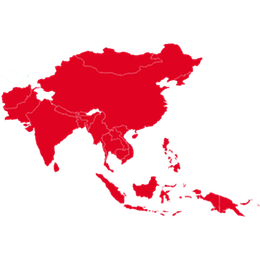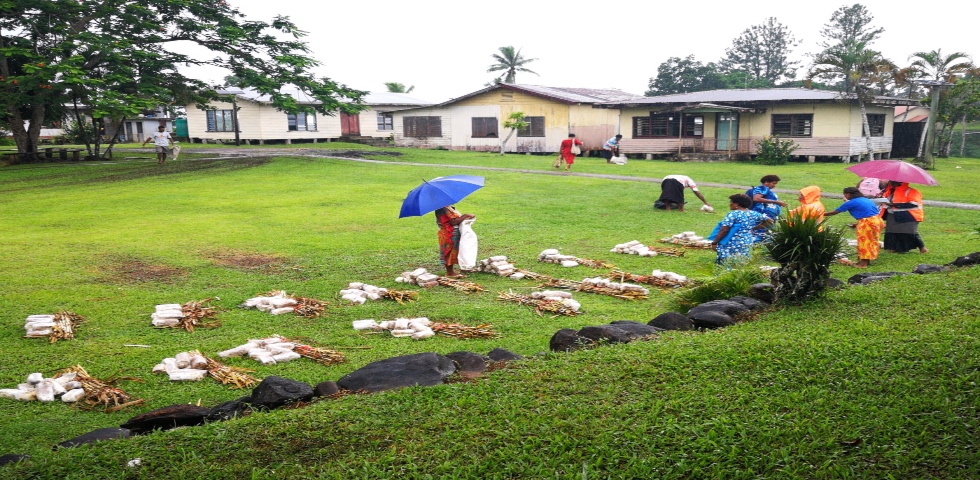Juncao Technology
“A Suva resident named Mr. Marshall...achieved FJD15,000 (US$7,230) of output value by converting a shipping container into an advanced grow house and cultivating 3,000 bags’ worth of king oyster mushrooms for the first time.”
BACKGROUND
Low-lying land, heavy rainy seasons, and prolonged dry seasons can make it difficult for farmers in Fiji to secure a sufficient supply of forage. Shortages of forage have restricted the development of the animal husbandry industry in the country, thereby limiting incomes in its rural areas. Mushroom cultivation can also be difficult, as the island nation is vulnerable to severe tropical cyclones that flood fields and destroy crops. Storms can cause farmers great economic losses and lead to mushroom shortages in Fiji, necessitating expensive imports. As a result, Fiji is concerned with expanding its mushroom cultivation and animal husbandry industries and finding ways to mitigate the damage from natural catastrophes and increase the resilience of local production.
WHAT’S INVOLVED
Mushroom, grass and animal farming: In order to improve food security in Fiji, Fujian Agriculture and Forestry University launched the China-Aid Juncao Technology Demonstration Center Project, which aims to improve mushroom cultivation and animal husbandry by sharing with farmers new techniques in conjunction with Juncao cultivation. Because the grass can be used as both fodder and a medium for growing edible and medicinal mushrooms, Juncao can help address Fiji’s agricultural shortages.
Demonstration base: A cultivation base was established for the purpose of demonstrating various concepts associated with the projects.
Family farming: Participating families produce agricultural products and enhance their output on their own farms.
Training programs: Training was provided, some of which was designed for women and people with disabilities
EXPLORE THIS SOLUTION
The Juncao solution offers information about:
- A mushroom cultivation system and related techniques
- A way to grow livestock fodder in areas that are very warm and dry.
- Establishing a cultivation base that demonstrates these concept.
- Providing training for women and people with disabilities in conjunction with these endeavors.

Countries involved
China, Fiji
Project partners
Fujian Agriculture and Forestry University
Project dates
2014 – present
Share this solution
Bookmark this solution
BookmarkShow Full Solution
Summary
By introducing the Juncao species of grass in Fiji, the Fujian Agriculture and Forestry University enabled smallholder farmers to greatly improve their incomes. Juncao can be used as feed for livestock during dry seasons and as a medium for cultivating edible and medicinal mushrooms.
Challenge/Problem
Low-lying land, heavy rainy seasons and prolonged dry seasons can make it difficult for farmers in Fiji to secure a sufficient supply of forage. Shortages of forage have restricted the development of the country’s animal husbandry industry, thereby limiting incomes in its rural areas. Mushroom cultivation can also be difficult, as the island nation is vulnerable to severe tropical cyclones that flood fields and destroy crops. Storms can cause farmers great economic losses and lead to mushroom shortages in Fiji, necessitating expensive imports. As a result, Fiji is concerned with expanding its mushroom cultivation and animal husbandry industries and finding ways to mitigate the damage from natural catastrophes and increase the resilience of local production.
Solution
Juncao is a hearty species of grass, discovered by Chinese scientists in the 1980s, with several poverty-reducing applications. In order to improve food security in Fiji, the Fujian Agriculture and Forestry University launched the China-Aid Juncao Technology Demonstration Center Project, which aims to improve mushroom cultivation and animal husbandry by sharing with farmers new techniques in conjunction with Juncao cultivation. Because the grass can be used as both fodder and a medium for growing edible and medicinal mushrooms, Juncao can help address Fiji’s agricultural shortages.
To improve mushroom cultivation, experts from the school conducted comprehensive field research and devised specific cultivation strategies. They introduced machinery for a Juncao mushroom production line with an annual output capacity of 300 tons and designed a series of easy-to-learn, low-cost cultivation techniques. For example, mushroom bags were placed in shallow furrows in coconut palm and mango groves. The bags were covered with a layer of soil in order to reduce heat and sunlight exposure, which can be severe in Fiji and impede mushroom growth. They were also watered regularly in order to mitigate the country’s dry seasons. These methods made it possible for farmers to harvest mushrooms within seven to ten days of sowing spores.
Participating families then produced various agricultural products at the base and on their own farms. The project management team also helped residents who were not living in poverty but wanted to increase their incomes, sharing with them a growth model that involves equipping temperature-controlled shipping containers with ventilation fans, lighting, fruiting racks and automated spray systems at a low cost. One participant was a Suva resident named Mr. Marshall, who achieved FJD15,000 (US$7,230) of output value by converting a shipping container into an advanced grow house and cultivating 3,000 bags’ worth of king oyster mushrooms.
Results
As of 2020:
• The Fujian Agriculture and Forestry University has established a Juncao demonstration base that features a two-hectare demonstration area involving mushroom and mango intercropping. It also includes a one-hectare training, production and processing area where 12 types of mushrooms are grown under trees and soil, in grow houses, and in refrigerated containers. More than 1.2 million bags’ worth of edible mushrooms have been grown, worth more than 5 million FJD (US$2.41 million).
• One thousand families are growing Juncao grass on more than 466 hectares of land in Fiji, which has greatly reduced water and soil loss and cattle and sheep mortality during dry seasons. The total cattle inventory has grown from 1,000 head to 5,700, and 300 head of sheep are now being raised as well.
• Fiji authorities plan to create an organic beef and mutton certification system and export beef cattle to neighbouring island countries.
• Thirty-three training workshops have been held throughout Fiji, benefitting 1,424 participants, including 807 women and 68 people with disabilities; 45 agricultural management officials and technicians from Fiji received training at Fujian Agriculture and Forestry University; and a total of 2,488 students in 268 groups have taken Juncao courses at the demonstration base.
Lessons Learned/Potential for Replication
1. When growing mushrooms in conjunction with Juncao, it is important to adapt to local conditions. Chinese experts experimented with different types of mushrooms in order to find the most appropriate to grow in Fiji.
2. A comprehensive mushroom industry growth strategy should be created after determining which varieties are best suited to a given area. Experts created various cultivation plans for residents based on local conditions and developed many practical methods to complement the techniques for improving output.
3. Juncao promotes sustainability and environmental protection in addition to productivity. The Juncao base established in Fiji was designed to demonstrate these principles as well as various agricultural concepts.
4. It is also possible for this type of project to incorporate initiatives related to women’s empowerment. Training programs were developed and working opportunities were created for women in the areas where the solution has been implemented.
Next Steps
The Fujian Agriculture and Forestry University plans to introduce Juncao to more developing countries and help their residents cultivate it. Juncao can resist harsh environments, increase productivity, boost other agricultural products, protect the environment and increase incomes. The grass will continue to be used to support women and help them become more prosperous as well.
Last update: 28/06/2021


